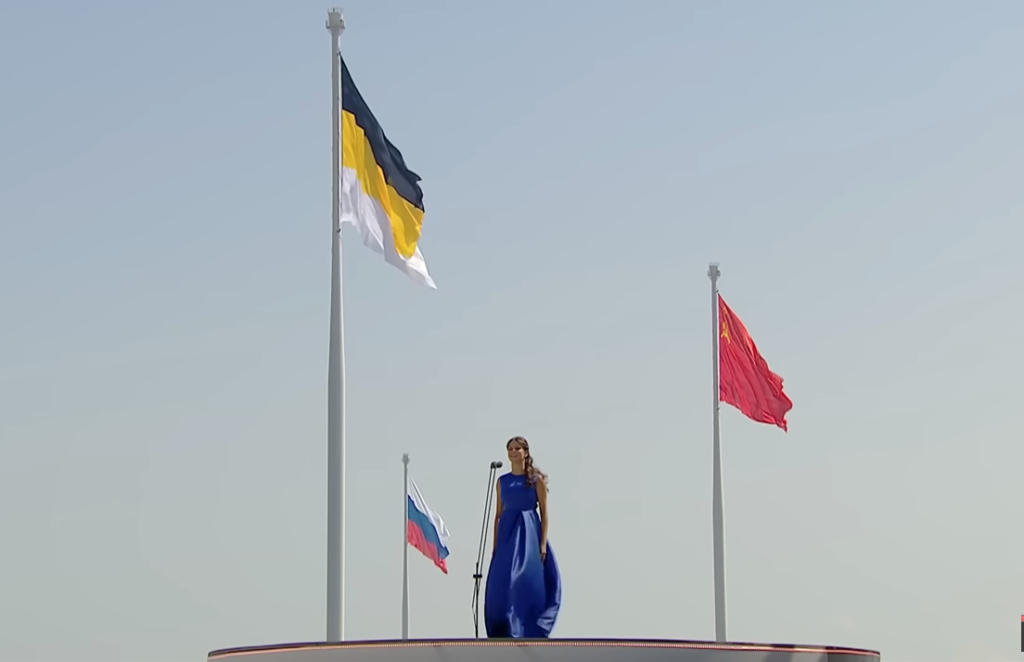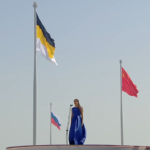On June 17, 2023, in the park of the tercentenary of St. Petersburg there was a ceremony of raising three huge flags of the Russian statehood. They were the black-yellow-white flag of Imperial Russia, the red flag of the Soviet Union and the white-blue-red flag of the Russian Federation. They fly on 180 meter high masts anchored on the bottom of the Gulf of Finland. Each flag measures 40 x 60 meters (two such flags would cover a soccer field) and weighs half a ton. The ceremony was attended by a number of high-ranking officials, including Russian President Vladimir Putin, who watched the festivities from a yacht, accompanied by a Gazprom CEO who explained the details to him. An orchestra played celebratory music – including the national anthem of the Russian Federation – while actors recited patriotic poems during intermissions. So much for the event.
The flying of three historically successive flags is an important indication of the continuity of Russian statehood. Only a few years ago, no one would have dared to dream that the flag of the Soviet Union would fly on an official mast. Today, after the orchestrated attack on Russia – its leadership, elites and ordinary people have returned to a fervent patriotism. Polls show that the popularity of Joseph Stalin and the Soviet Union is on the rise. And why? Because of the work of the psychologists of the West. They knew no moderation when it came to propagandizing Russian citizens and dragging the Russian past through the mud. Everything Soviet and everything Russian – that was the message inculcated in the citizens of the Federation – was supposed to be absolutely bad, evil, vile and repugnant. This worked up to a certain point. Then the realization dawned on even the dumbest minds: damn it, when we (Russians) were under the brutal tyrant, the West feared us; now that we are Westernized and want to comply with Western demands, the West began to trample Russia underfoot on a regular basis.

The Western managers of the world are supposedly advised by experienced sociologists, psychologists and masters of propaganda, at least that is what we are told. Strange. Like King Midas, everything these specialists touch turns sour. A frontal attack on a country – any country – usually causes the people to rally around their leader, whether he is a dictator, a satrap or a tyrant. Not for nothing do some historians say that the civil war in the Soviet Union that broke out after the Bolshevik coup d’état, commonly referred to as the Bolshevik or Russian Revolution, actually ended in 1941 and not – as officially stated – in 1923. While fratricide may have ended around 1923, the deep rift that ran through all segments of society did not. Then came June 22, 1941, the German attack that stretched from the Baltic to the Black Sea, and all walks of life and ethnic minorities rallied around Joseph Stalin, even though many had hated him just a day before the outbreak of hostilities.

Certainly, Vladimir Putin does not remotely resemble Joseph Stalin, even if Western propaganda would have people believe so. How much more must the citizens of Russia rally around him now that they are all under relentless attack – economic and psychological? In this context, think of the Germans during World War II and their unwavering loyalty to Adolf Hitler. The Western Allies thought they could break that loyalty when they began carpet bombing German cities. With what result? There was not a single uprising. Even the incineration of Dresden three months before the end of hostilities did not help the Allies in this regard. The civilian survivors remained defiant against the enemy and even more loyal to the authorities. Why do policymakers in the West believe that this time will be different?
Just think of it. If you had listened to President Putin’s speeches over the last twenty years – and I dare say you haven’t – you would have noticed [1] how often he proposed cooperation between the collective West and Russia (including Russia’s membership in NATO), and [2] how often he warned the collective West not to expand its military presence in Ukraine. All of this fell on deaf ears. At the time, Russian elites were willing to do almost anything the West wanted to impose on them, but they expected a certain degree of reciprocity: equal treatment and respect. By 2000, Russia was down and out, displaying a fawning attitude toward everything Western. As so often happens – no less a person than Aesop, the Greek author of moral fables, described this phenomenon more than two millennia ago – the West seeing a weak partner and decided to make a killing. And yes, the West would have succeeded if Russia had been ruled by another Boris Yeltsin. Tough luck, though: Boris Yeltsin was replaced by Vladimir Putin.
But Vladimir Putin, as mentioned above, was also ready to cooperate instead of compete, to reciprocate good deeds instead of retaliating against bad ones, to benefit from each other instead of harming each other. In vain. Early on, he was labeled a dictator and treated as such. For a long time, the world’s Western managers tried to turn some of Russia’s elites against the country’s leader. This could have succeeded: After all, if Russian billionaires and millionaires had their accounts in Western banks, if they bought real estate in the West, if they had their children educated in Western universities, if – last but not least – Russian elites driven by inferiority complexes (so typical of Central and Eastern European nations) desperately tried to shake off their – as they thought – Russian backwardness and adopt the Western way of life, then these Russian elites were easy prey for the Western powers. Unfortunately for the Western elites, their overconfidence, vanity, coupled with utter contempt for their great Eastern partner, led them to overplay their hand. As a result, they must now watch in horror the resurgence of Russian patriotism, the strengthening of Russian consciousness of historical continuity, the reconciliation of Russia with its past, and the rallying of Russian citizens around the Russian leader. Moderation would have led to the West’s gentle domination of Russia; high-handedness has led to a clash. Moderation would have further weakened Russia’s patriotic and compliant spirit; hostility has aroused self-respect and self-esteem.
The three flags flying on the three poles symbolize not only historical continuity, but also unity between Russians of different political persuasions: Monarchists, Post-Communists, Republicans, you name it. Looking at the three symbols, everyone finds something for himself, for his beliefs and feelings. Would an American president dare to fly the Confederate flag opposite the national flag of the United States to please Southerners? Would a French president raise a white flag along with the French national flag to please French royalists? Would a German chancellor fly the German imperial flag – let alone the flag of the Third Reich! – in front of the Bundestag to show the continuity of German statehood? Would a German chancellor allow the flag of the short-lived German Democratic Republic to be displayed in a public place on an equal footing with today’s flag? No, European leaders prefer the flag of the European Union to their national symbols, while some of them – Angela Merkel in particular – are known to regard the national flag with disgust.




